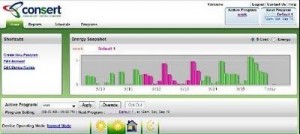 [5]Eco-nomics: Full Information and Efficiency
[5]Eco-nomics: Full Information and Efficiency
By Patrick Emerson [6]
Oregon Economics Blog [7]
One of the requirements necessary for a free market to reliably achieve an efficient outcome is full and symmetric information. So this article [8] on a smart electricity grid pilot project is pretty interesting. What this project did, in essence, is give customers real-time information on energy usage from all parts of the house.
“Consert attached controllers on hot water heaters, air conditioners and pool pumps and then let customers go online and set targets for their monthly electricity bill. Smart meters and a wireless communications system provide real-time electricity consumption data to allow the utility to cycle appliances on and off to achieve the savings and help it manage peak demand.”
The initial results are pretty dramatic: a 20% decline in average energy usage.
Regardless of the ‘target’ usage, what this system does is provide information to consumers about how much energy they are consuming and how much it is costing them. Not knowing this information apparently causes consumers to use more energy than they would in the full information setting. This suggests that current market outcomes for energy are inefficient (in the economics sense – we are not maximizing societal welfare) and that this inefficiency comes from an asymmetric information problem.
I think what this suggests in general is that if technology can allow consumers to understand the real-time monetary cost of energy usage, some pretty substantial conservation could be achieved, both in current consumption (like the pilot project) and in energy saving investments which, this suggests, would more likely occur if the true cost of energy usage were immediately apparent.
